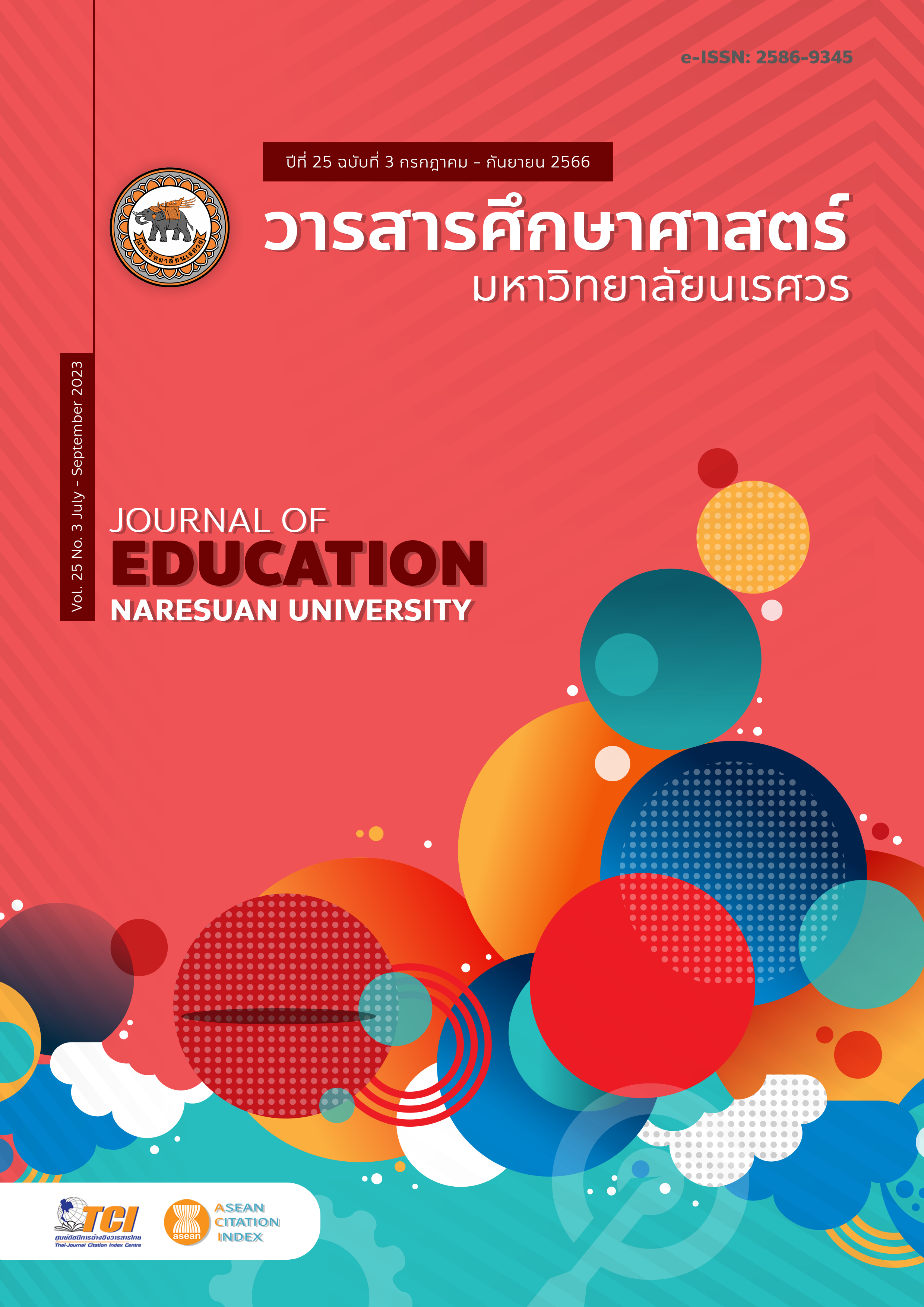DEVELOPMENT OF EXTENSIVE LISTENING ACTIVITIES FOR LISTENING COMPREHENSION OF THAI SECONDARY SCHOOL STUDENTS
Main Article Content
Abstract
This study aimed to 1) investigate the effects of extensive listening on English listening comprehension of Thai secondary students and 2) examine how students listen via extensive listening instruction. Eighteen students from a public secondary school who enrolled in the elective subject were chosen to participate in the 10-week-instruction by convenient sampling. The instruments used to collect data were a listening comprehension test to assess students’ listening comprehension for quantitative data, listening journals to explore how students practice English listening outside the classroom and semi-structured interviews to conduct in-depth data qualitatively. It can be concluded that 1) the post-test mean scores of the students from the listening comprehension test were higher than the pre-test mean scores of the students at a significant level (p < .05) with a large effect size (Cohen d = 1.09) and 2) students who achieved high gain scores reported greater rates of subtitles application, repeated listening strategy, and intrinsic motivation.
Article Details

This work is licensed under a Creative Commons Attribution-NonCommercial-NoDerivatives 4.0 International License.
The owner of the article does not copy or violate any of its copyright. If any copyright infringement occurs or prosecution, in any case, the Editorial Board is not involved in all the rights to the owner of the article to be performed.
References
Bernard, J. (2010). Motivation in foreign language learning: The relationship between classroom activities, motivation, and outcomes in a university language-learning environment (Master thesis). USA: Carnegie Mellon University, Pennsylvania.
Bhattacharya, A., & Chauhan, K. (2010). Augmenting learner autonomy through blogging. ELT Journal, 64(4), 376-384.
Bibby, S. (2020). Listening in the language classroom: The case for extensive listening. Theoretical and applied linguistics at Kobe Shoin, 23, 1-11.
Black, A. E., & Deci, E. L. (2000). The effects of instructors' autonomy support and students' autonomous motivation on learning organic chemistry: A self-determination theory perspective. Science Education, 84(6), 740–756.
Chaibao, C. (2017). Listening problems of mattayom 3 ISME program students at a Thai secondary school (Independent study). Bangkok: Thammasart University.
Chang, C. S., & Read, J. (2006). The effects of listening support on the listening performance of EFL learners. TESOL Quarterly, 40, 375–397.
Chang, A., Millett, S., & Renandya, W. (2019). Develop listening fluency through supported extensive listening practice. RELC Journal, 50(3), 422-438.
Cohen, J. (1977). Statistical power analysis for the behavioral sciences (revised edition). Academic Press.
Day, R. R., & Bamford, J. (2002). Top ten principles in teaching extensive reading. Reading in a Foreign Language 14(2), 136-141.
Day, R. R. (2018). Extensive reading. The TESOL Encyclopedia of English Language Teaching, 1-7. https://doi.org/10.1002/9781118784235.eelt0472
Deci, L.E., Nezlek, J., & Sheinman, L. (1981). Characteristics of the rewarder and Intrinsic motivation of the rewardeee. Journal of Personality and Social Psychology, 40(1), 1-10.
Extensive Reading Foundation. (2011). Extensive Reading Foundation’s guide to extensive reading. Retrieved from http://erfoundation.org/wordpress/wp-content/uploads/2013/08/ERF_Guide.pdf
Holden, W. R. (2008). Extensive Listening: A new approach to an old problem. Journal of the Faculty of Humanities, University of Toyama, 49, 299-312.
Ivone, F., & Renandya, W. (2019). Extensive listening and viewing in ELT. TEFLIN Journal, 30(2), 237-256.
Kaur, A., Young, D., & Kirkpatrick, R. (2016). English education policy in Thailand: Why the poor results? English Language Education Policy in Asia, 11, 345-361.
Khamprated, N. (2012). The problems with the English listening and speaking of students studying at a private vocational school in Bangkok, Thailand (Master thesis). Bangkok: Srinakharinwirot University.
Krashen, S., Lee, Sy-Ying, Lao, Christy. (2018). Comprehensible and compelling: The causes and effects of free voluntary reading. ABC-CLIO, California, United States of America.
Masrai, A. (2020). Can L2 phonological vocabulary knowledge and listening comprehension be developed through extensive movie viewing? The case of Arab EFL Learners. International Journal of Listening, 34(1), 54-69.
Mayora, C. A. (2017). Extensive listening in a Colombian university: Process, product, and perceptions. HOW, 24(1), 101-121.
Melani, M. (2020). The effect of Google classroom assisted extensive listening on listening comprehension across learning autonomy. Lingua Cultura, 14(1), 129-142.
Pradermprach, N. (2017). The Problems of English Language Education at the Upper Secondary Level in Thailand: The Perceptions of Thai EFL Teachers and Students in Bangkok (Doctoral dissertation). England: University of Warwick, Warwickshire.
Renandya, W. A., & Jacobs, G. M. (2016). Extensive reading and listening in the L2 classroom. In W. A. Renandya, & Handoyo, P. (Eds.), English language teaching today (pp. 97-110). New York: Routledge.
Renandya, W., & Day, R. (2020). The primacy of extensive reading and listening: Putting theories into practice. Language, Education, and Policy for the Changing Society: Contemporary Research and Practices. Bandung: UPI Press.
Simasangyaporn, N. (2016). The effect of listening strategy instruction on Thai learners’ self-efficacy, English listening comprehension and reported use of listening strategies (Doctoral dissertation). England: University of Reading, Reading.
Suwannasit, W. (2019). EFL learners’ listening problems, principles of teaching listening and implications for listening instruction. Journal of Education Naresuan University, 21(1), 345-359.
Takaesu, A. (2017). TED Talks as an extensive listening resource for EAP students. Asian-Focused ELT research and practice: voice from far edge. IDP Education. Phnom Penh, Cambodia.
Tantihachai, K. (2016). Foreign Language Anxiety in Listening and Speaking English in a Thai EFL Classroom. (Doctoral dissertation). England: University of Exeter.
Tieocharoen, W., & Rimkeeratikul, S. (2019). Learning Strategies and Teaching Methods in Thai and Vietnamese Universities. Arab World English Journal, 10(3), 99-112.
Vandergrift, L. (1999). Facilitating Second Language Listening Comprehension: Acquiring Successful Strategies. ELT Journal, 53(3), 168-176.
Vandergrift, L. (2011). Second language listening: Presage, process, product, and pedagogy. New York: Routledge.
Yeldham, M. (2016). 2 Approaches to L2 listening instruction. The European Journal of Applied Linguistics and TEFL, 5(2), 31.


